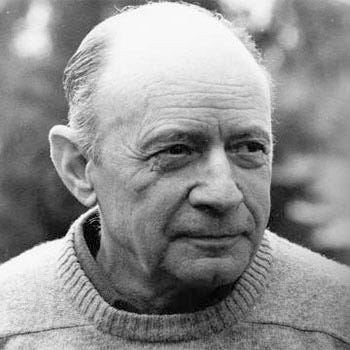How I Met Jacques Ellul
On that time my professor was a prophet
I had the privilege of studying under Dr. Harold O.J. Brown—elite academic, beloved professor, and one of the founders of the pro-life movement1. “Juice,” as we sometimes affectionately called him (never to his face), is by far the most intelligent man I’ve ever known. There would be times in lectures that he would seemingly change topics altogether in what appeared to us to be mid-thought. It left us wondering if this old professor with an eye patch and limp2 was losing his mind, unable to carry on a single line of thought. I developed a theory about this odd lecture quirk. I began to realize that at any one time, Dr. Brown was carrying on three or four different lines of inquiry in his mind, even as he lectured in his Christian history and ethics classes. What seemed to us be a distracted change of topic was to him a leap to another running thread in his mind that somehow related to the topic at hand. It was in one of Dr. Brown’s cognitive leaps that I was first introduced to Jacques Ellul.
Dr. Brown was lecturing on some aspect of Christian ethics and how it related to pastoral ministry. I don’t remember the specifics, but I do remember the sudden jump. Suddenly, Dr. Brown was talking about the dangers of technology and immigration. This was in 2002, and these were not regular topics discussed in an ethics course in seminary. He said something like, “If you want to prepare for what is coming, you need to read The Technological Society by Jacques Ellul and Camp of the Saints3 by Jean Raspail.” These weren’t required texts for that class; they were just another one of those off-handed, unexpected, erudite comments we grew to expect from Dr. Brown. But I knew enough about Dr. Brown to buy any books he recommended, off-handed comment or not. It turns out, now twenty years after he made that comment, he was something that he’d be uncomfortable with me calling him—prophetic.
But before I leave my recollections of Dr. Brown behind, I need to relay one other important anecdote. Dr. Brown was an accomplished author by any standard. But by no means did he write as many books as he could have written. We, his students, often found ourselves listening to course lectures that were so uniquely profound that we knew we had better keep good notes because there was no other written source we could find material like what Dr. Brown was teaching us. This led one of us (I don’t remember who) to remark in class, “Dr. Brown, you need to write more books!” He stopped for a moment to answer, not because he had never considered the option but because it was something he had thought long about. He stretched out his arms wide, turned his palms to us as if he was giving a benediction, and said, “You are my books.”
I’ve thought about that comment for a long time with a sense of gratitude and burden. I was neither Dr. Brown’s favorite nor best student. But I knew the man with affection, and I know he cared about me, cared enough to teach me the best of what he knew in every lecture, in every personal conversation we had in his office cluttered with books, swords, and pictures of him on the side of a mountain. I’m grateful to have known Dr. Brown and grateful to have been one of his students. But I also feel the weight of being one of his “books.” It is the weight and responsibility to pass on what I’ve learned. That is a big part of why I picked up Ellul’s Technological Society. It is a big part of why I’ve read it repeatedly through the years. And it’s a big part of why I’m writing about him now. Dr. Brown said to understand what was coming, we needed to read Ellul. And Dr. Brown was right; what was coming is now here.
Along with Francis Schaeffer and C. Everett Koop.
He earned both by saving a friend from careening off the side of a cliff in a mountaineering expedition. Dr. Brown was not your typical academic.
It wasn’t until the last three years that I realized how important this second book would be as predictive of a global crisis that rages on even as I write this.


